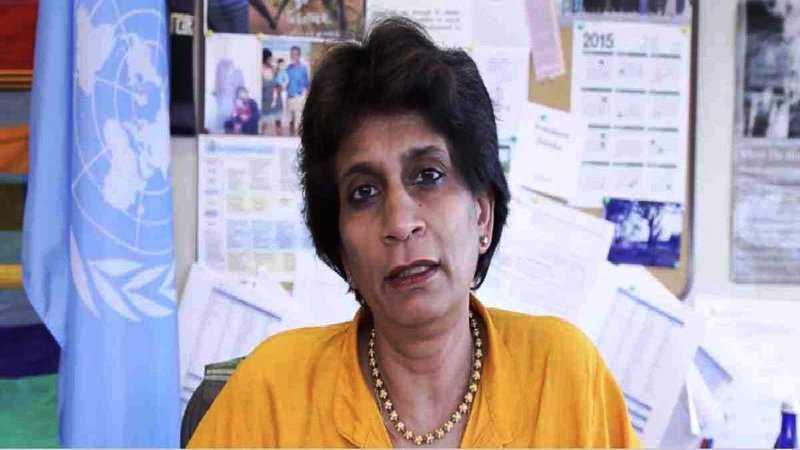Green jobs, closing gender gaps, digital transformation major issues for foreseeable future work: UN

Image collected
Kanni Wignaraja, UN Assistant Secretary-General has said that several key issues frame the agenda for near future of job -- digital transformation, green jobs, the reliance of adaptive techniques, and closing the gender gap in careers.
“If countries, communities, and households will have an opportunity to recover and make contact with having a reasonable and sustainable method of livelihood, then your future of work should be addressed and it should be performed quickly,” said Wignaraja, also Associate Administrator & Director of the Regional Bureau for Asia and the Pacific of UNDP.
With a view to facilitating South-South cooperation and accelerating Bangladesh towards a more robust economy with consideration of the numerous challenges it really is facing, the UNDP in collaboration using its Bangkok Regional Hub introduced the Future of Work Lab over a virtual program, said UNDP on Friday.
Deputy Resident Representative of UNDP, Van Nguyen delivered the welcome remarks in the session, followed by official inauguration by Wignaraja.
Situated in Bangladesh, the Laboratory will assist the Asia Pacific area.
“Its success will quite definitely rely upon the partnerships it varieties… it requires a network of open public and individual sector, UN companions such as for example ILO and any office of SS, academia and NGOs,” said Wignaraja.
A report titled “Post COVID-19 Jobs and Abilities in Bangladesh” was also introduced at the program, which identifies 11 huge impact sectors where jobs have been lost, and five emerging sectors where new careers are being created.
Over the next twenty years, huge changes are anticipated later on of Work (FoW) for Bangladesh as automation, artificial cleverness, fourth professional revolution and other trends, including the shift to a circular market, threaten existing jobs in key industries such as garments and textiles.
SDG Integration Business lead of UNDP Bangkok Regional Hub, Christine Wellington-Moore and Lead of Future of Do the job and South Cooperation Group at a2we, Asad-Uz-Zaman delivered a demonstration on Future of Work Lab in Bangladesh.
A recent study commissioned by a2i suggested that due to COVID, 20.45 million persons already dropped their jobs in Informal and SME, Transportation, Construction, Furniture, Readymade Garments & Textile, Leather Goods & Footwear, Tourism & Hospitality, Light Engineering, Migration, Ceramic and Real Estate & Housing Sector. In addition, it displays that by the finish of 2021, 3.92 million new jobs will be created in emerging sectors, like Agro-Food, Health care, Pharmaceuticals, ICT & e-Commerce and Creative Media Sector.
a2i has worked with the Bangkok Regional Hub to build up Future of Work lab, which will move beyond merely matching demand and skill to take into consideration social protection, safe migration of workers, entrepreneurship support, digital transformation to make sure continuity of community and private sector products and services, and resilience of key supply chains etc.
During a panel debate, Sudipto Mukerjee, Resident Representative of UNDP stated in Bangladesh, you will find a mixed trend in conditions of organization. Some big corporates will use this to purchase generating social goodwill.
He said investments will be made to make the supply chain more resilient towards weather change and other concerns.
"Another group will repurpose, for example, RMG producers might opt to make PPEs. But you will have another category, although lowering in numbers that may continue being irresponsible and exploitive. This previous group must be monitored by the federal government. We must help ease the procedure of transition. That is a period for solidarity and most of us need to come and work together.”
Cabinet Secretary Khandker Anwarul Islam said, “Whenever ambitious plans such as Future of Work Laboratory are developed, we carry out it when confronted with challenges. This time, the challenge can be pandemic. But there will be advantages aswell -- this fiscal year’s price range has a 14 percent allocation for the public safety net. We have recently approved a three billion dollar program for youth’s skill-building. Thus there is the reason for optimism for the future.”
Denis Nkala, Regional Coordinator (Asia - Pacific) at US Office for South-South Cooperation, Denis Nkala; UNDP Bhutan Resident Representative Azusa Kubota; UNDP Maldives RR Akiko Fujii and Coverage Adviser of a2i, Anir Chowdhury as well spoke in the panel.
Source: http://www.theindependentbd.com
Tags :
Previous Story
- UN high-ups for postponing LDC graduation of Bangladesh
- UN statement: Bangladesh’s gender wage gap lowest on...
- Bangladesh to join UN Climate Summit on Sept...
- Planner makes world's first adaptable 3D drawn and...
- UN trade body lauds Bangladesh’s e-trade growth
- What graduating out of LDC status means for...
- GEF: Bangladesh economy to enjoy prosperous 2019
- IMO Launches Phase II of Bangladesh Ship Recycling...